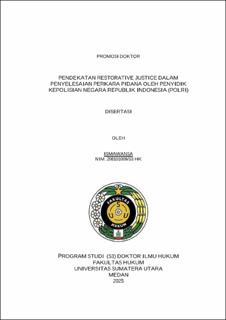Pendekatan Restorative Justice dalam Penyelesaian Perkara Pidana oleh Penyidik Kepolisian Negara Republik Indonesia (POLRI)
The Restorative Justice Approach in Resolving Criminal Cases by the Investigators of the Indonesian National Police (POLRI)

Date
2025Author
Ismawansa, Ismawansa
Advisor(s)
Syahrin, Alvi
Ekaputra, Mohammad
Din, Mohd
Metadata
Show full item recordAbstract
The Restorative Justice (RJ) approach in Indonesia’s criminal justice system has become a crucial aspect of national legal reform. In practice, police investigators play a pivotal role in implementing RJ to achieve a more inclusive and recovery-oriented justice system. However, the implementation of RJ still faces various challenges, particularly concerning legal certainty, regulatory harmonization, and limitations within the broader law enforcement system. Therefore, this study aims to analyze an ideal RJ model for resolving criminal cases by police investigators, considering an approach based on Pancasila values and best practices from various countries. This study employs a normative legal research method with a conceptual and comparative approach. Data is collected through a literature review of various regulations, legal rulings, and previous studies on RJ in Indonesia and other jurisdictions. The analysis is conducted using the theory of legal certainty, the legal system theory, and the restorative justice theory to formulate a model that can be adopted within the national legal framework. Additionally, this research examines various factors that hinder the implementation of RJ at the investigative level and proposes solutions to address these challenges. The findings indicate that RJ by police investigators lacks a strong legal foundation, potentially violating the lex superior derogat legi inferiori principle. The primary obstacles to RJ implementation include legal substance (lack of regulatory harmonization), legal structure (limited investigator authority and insufficient training), and legal culture (low public awareness of RJ). A comparative analysis with RJ systems in the Netherlands and New Zealand highlights that legal certainty and community involvement are key factors in the successful implementation of RJ. As a solution, this study recommends the establishment of a comprehensive RJ law to provide a clear legal basis for police investigators in applying RJ. Additionally, intensive training for law enforcement officers and public awareness programs are necessary to enhance the effectiveness of RJ in criminal case resolution. The ideal RJ model in Indonesia should be based on Pancasila values, emphasizing the principles of deliberation, social recovery, and substantive justice to create a more humane and equitable legal system.
Collections
- Doctoral Dissertations [173]
